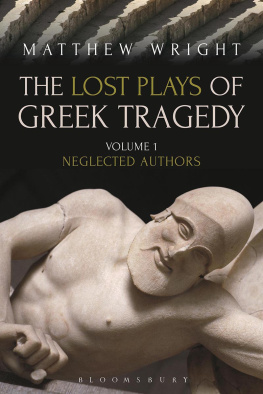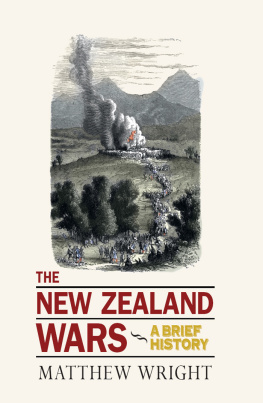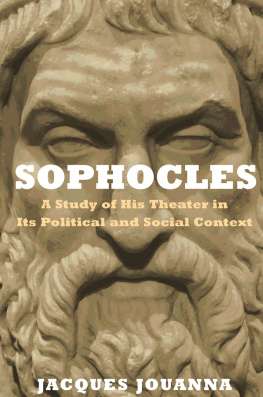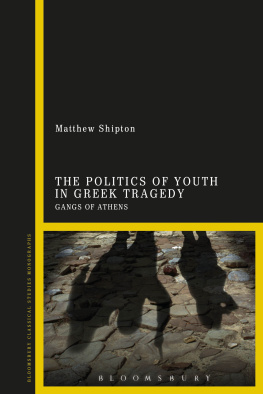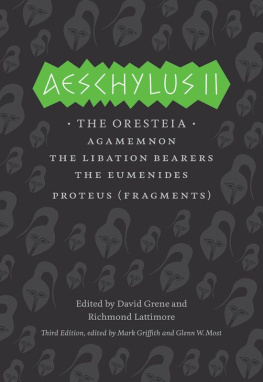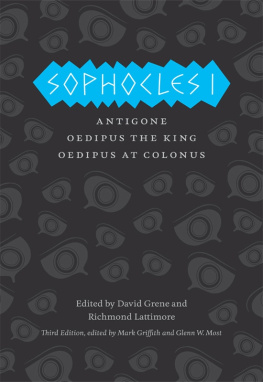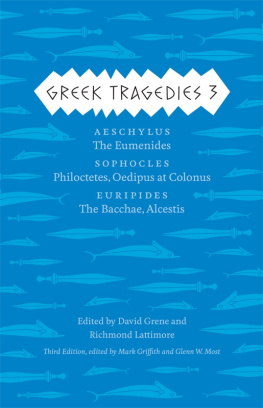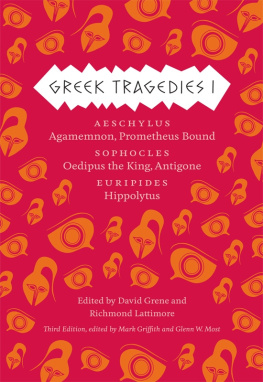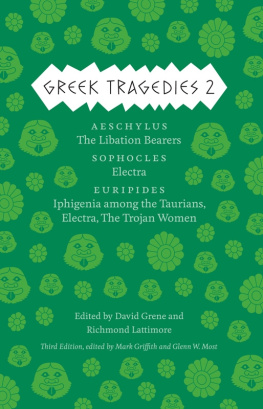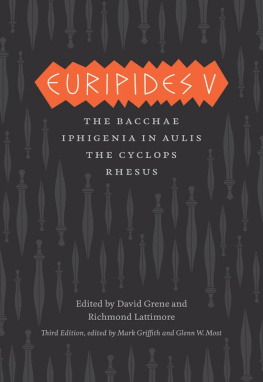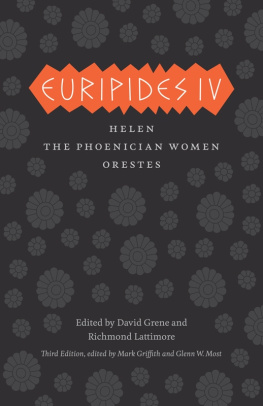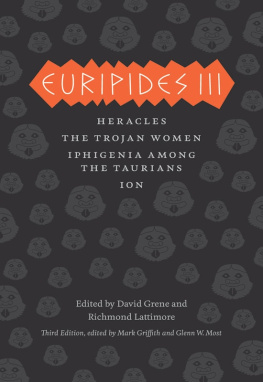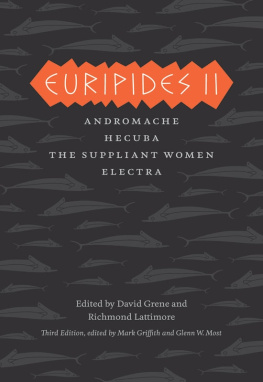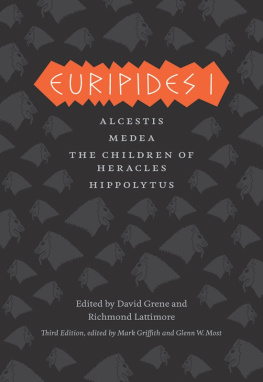
The Lost Plays of Greek Tragedy
Also available from Bloomsbury
Greek Tragedy: Themes and Contexts, Laura Swift
Hellenistic Tragedy: Texts, Translations and a Critical Survey, Agnieszka Kotlinska-Toma
Ovid: A Poet on the Margins, Laurel Fulkerson
The Plays of Aeschylus, A. F. Garvie
The Plays of Euripides, James Morwood
The Plays of Sophocles, A. F. Garvie

Contents
I began working on this book during a very happy year at Vassar College, where I was Blegen Research Fellow in 201112. Special thanks are due to Curtis Dozier, Rachel Friedman, Rachel Kitzinger, Bert Lott, Barbara Olsen and Robert Brown, for giving me the warmest possible welcome and providing plenty of encouragement and intellectual stimulus.
Back in Exeter, I have been helped and guided in all sorts of ways, as ever, by Richard Seaford and John Wilkins to whom, on the occasion of their retirement, I dedicate this book in return for many years of friendship and collegiality.
M.E.W.
Exeter
December 2015
Their ghosts are gagged, their books are library flotsam,
Some of their names not all we learnt in school
But, life being short, we rarely read their poems,
Mere source-books now to point or except a rule,
While those opinions which rank them high are based
On a wish to be different or on lack of taste.
Louis MacNeice, Elegy for Minor Poets
There are already so many books about Greek tragedy that the appearance of yet another might seem to call for special apology or explanation. What marks this one out as different is that, whereas nearly all the others deal with the thirty-two tragedies that still survive today, I am concerned exclusively with the tragedies that no longer exist. Many hundreds of tragedies were performed, in Athens and further afield, during the classical period, and even though almost all of them are lost, a certain amount is known about them through fragments and other types of evidence. Nevertheless, this material is not easily accessible to the general reader, and it has not always been fully discussed or integrated into scholarly accounts of the tragic genre. What I aim to provide here is the first comprehensive study of all the lost plays and neglected authors of Greek tragedy, which gathers together and presents the evidence in a thoroughly accessible and reader-friendly way. I also make available a complete English translation of the fragments for the first time.
The amount of material to be discussed proved too much for a single book, and so what you are holding in your hands right now is Volume 1: Neglected Authors. It discusses the tragic genre from its sixth-century origins down to c. 322 BCE (the conventional end point for the classical period), and it includes every playwright known to us from that period except the three who are nowadays the most famous. I would have continued beyond this date but for the appearance of Agnieszka Kotliska-Tomas excellent new book Hellenistic Tragedy, to which readers are enthusiastically directed. Volume 2 (forthcoming) will be devoted to the lost plays of Aeschylus, Sophocles and Euripides. Between them the two volumes will offer a fresh perspective on Greek tragedy, showing that careful study of the lost works can lead to a reappraisal of the whole genre or, at least, a much more thorough, detailed and representative account of it than ever before. What emerges above all is that classical Greek tragidia was a fascinatingly rich, heterogeneous and, in many ways, unfamiliar type of drama. Certainly it possessed much more breadth and variety than we can appreciate if we only ever look at the tiny number of plays that survive.
The main justification for this book, then, is that it makes possible a more complete picture of a genre which is still very widely read, studied and performed. But it may also appeal to those who are fascinated by what we might call the aesthetics of loss in a more general sense. It is clear that lost works of art possess an unusually powerful attraction for a certain type of individual. I myself am such a person: I have always been intrigued by lost books, stolen manuscripts, variorum editions of works that were rewritten, proofs of books that were withdrawn before publication, deleted scenes from films among the DVD extras, and so on. It is hard to say exactly why this should be so (maybe there is some subconscious psychological explanation that I would be happier not to discover), but the large pile of books on my desk proves that I am not alone. These works include, for example, Rick Gekoskis Lost, Stolen, or Shredded: Stories of Missing Works of Art and Literature; Christopher Woodwards In Ruins; Philip Moulds Sleuth: The Amazing Quest for Lost Art Treasures; Michael Bywaters Lost Worlds; Umberto Ecos The Name of the Rose; George Steiners My Unwritten Books; Douglas Brodes Lost Films of the Fifties; Gavin Stamps Lost Cities: A Chronicle of Architectural Destruction; Robert Harbisons Ruins and Fragments; and Bernard Richards The Greatest Books Youll Never Read.
Such titles bear witness to a whole sub-genre of cultural studies that seems to have emerged or flourished during the last couple of decades; and it has been thought that this preoccupation reflects the peculiar anxieties of our own fragmented, postmodern twenty-first-century world. But perhaps it could be said that all who have ever engaged in the study of antiquity have experienced a similar feeling to some degree a vicarious nostalgia for a time and place in which we have never lived and which, until the invention of time-travel, will always remain impossible to access as fully as we would wish. Thinking about lost texts and reading fragments is very like being in a classical land and standing among the ruins of an ancient site: we can almost perceive what it used to be like in its original state, but notquite. Part of the appeal lies precisely in the mixture of closeness and distance, reality and imagination, longing and unattainability.
The ancient Greek world continues to hold an enormous fascination for many people, but this fascination sometimes seems to be inversely proportionate to the amount that is actually known about it. Essentially, we are dealing with a lost and vanished world, and we can scarcely remind ourselves often enough of its remoteness and obscurity. Every aspect of classical Greek civilization its history, its religion, its politics, its culture, its art and its literature is nowadays visible only in the tiniest of glimpses, via evidence which is drastically inadequate and hopelessly fragmentary.
This is no less true of Greek drama than of any other aspect of Greek culture. The Greeks of the archaic and classical period entertained themselves with many different types of poetry and performance, but these have almost entirely vanished not just in the sense that hardly anything survives of them, but in the sense that they have had virtually no influence in shaping subsequent literature or performance traditions. What do dithyrambs, satyr-plays, or mimes signify to most twenty-first-century readers or theatregoers? What except the merest vestigial trace is left of paeans, of propemptika, of partheneia, of prosodia, of circular choruses, of citharodic nomes? These and many other Greek performance genres are barely known even to those few scholars and specialists who still pore over the exiguous scraps of evidence. They have to be regarded not simply as lost but as more or less extinct.
Next page
